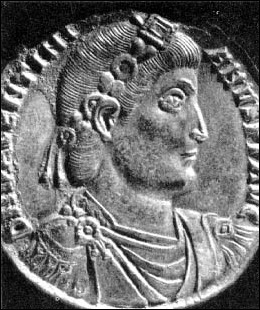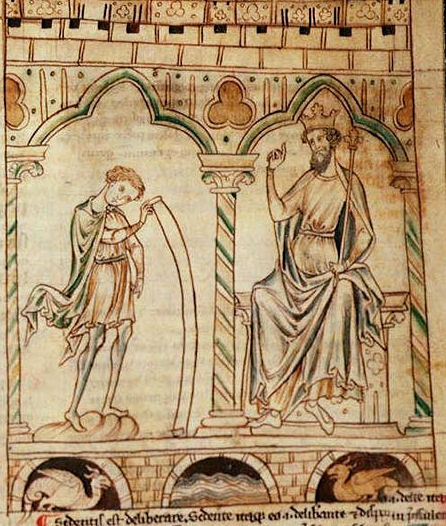Professor Guy Halsall author of the
Historian on the Edge blog makes the extraordinary suggestion that
Magnus Maximus may have been the
Superbus Tyrannus of Gildas' History of Britain written in the early sixth century as part of the De Excidio. Here is a quote from his post on his lecture from Feb 2011 on the subject of
Northern Britain and the Fall of the Roman Empire :
"Some of you may know that in my book on the Barbarians Migrations, I argued that it was Maximus who was behind the settlement of Saxons in Britain, as foederati: that he was the superbus tyrannus mentioned by Gildas in his De Excidio. I made this argument on the basis of a lengthy discussion of Gildas’ historical section, its structure and the parallelism within that. I don’t have time to rehearse all of that argument here, but I do want to add something of a lengthy foot-note to it, not least because I was put onto this tack by Alex Woolf, who suggested that one might find the key to all this by looking at Orosius. So I did look at Orosius, and indeed at everyone else in the late fourth and fifth centuries who wrote about Magnus Maximus. Sadly I didn’t find any clear textual borrowings or anything really nice such as Rufinus referring to Maximus as a superbus tyrannus or anything like that. What did emerge, though, is in some ways more interesting. And that is that it is really very difficult to see where Gildas got his picture of Maximus from.
Gildas is unremittingly hostile to Maximus: cunning rather than virtuous; attaching areas to his ‘kingdom [or rather Empire] of wickedness with the nets of perjury and lying’; his was a ‘wicked empire’; he ‘raged madly’, engaged in ‘appalling acts of daring’ and had ‘his evil head cut off’. Not surprising, if I’m right, that this tyrannus, referred to anonymously as supradictus tyrannus in De Excidio 14, the start of the ‘Northern Section’, should be described (again without his name) as superbus and infaustus in De Excidio 23, near the start of the so-called ‘Eastern Section’. Interesting, though hardly decisive, for my case is the emphasis on Maximus’ consilium that one finds if one reads through the contemporary and near-contemporary accounts and which might connect with the fact that it is indeed the council of the ‘Proud Tyrant’ which decides to enrol the Saxons in Britain’s defence."
There is some superficial evidence from the
Historia Brittonum (HB) that the Saxons may have been invited over earlier in around 374/5. This comes from the chronological information within the HB:
Guorthigirnus suscepit eos benigne et tradidit eis insulam, quae in lingua eorum vocatur Tanet, Brittannico sermone Ruoihm. regnante Gratiano secundo cum. Equitio Saxones a Guorthigirno suscepti sunt anno cccxlvii post passionem Christi.
 |
| Valentinian |
Here we can see the statement that Vortigern invited the Saxons at the time of the consuls Gratianus and Aequitius. This was in 374/5. The text gives the date as well, 347, post passion of Christ, which is 347+28 = 375. This was actually the time when
the Emperor Valentinian sent three armies of Alamannic troops to Britain to re-enforce the defences there. At the head of these armies are the kings Froamarius - given the title Tribune, Hortarius and Bitherides. The Irish HB tell us the same story as the Latin above, ie when `Gratian and Aquitias’ were consuls of Rome the Saxons came to Britain in the time of Vortigern. The only time when these consuls were joint rulers was in 374 AD. This Alamannic event appears to be confused with the arrival of Saxons and Vortigern. It is made even more confusing when we find that one Maximinus is now the Praetorian Prefect in Gaul, in charge of the administration of both Gaul and Britain, an `Overlord’ or `Super Lord’ in British terms and that in Milan his nemesis is one Sanctus Ambrosius. It remains only to say that these earlier traditions may have been mixed up with the later 5th Century Vortigern and Ambrosius in the writings of later historians.
These factors though all took place long before Magnus Maximus entered Britain in about 380, although he may have been in the army of Theodosius the Elder when he cleared up the barbarian conspiracy of the late 360's. Having looked at the chronology of Gildas concerning Maximus and the Superbus tyrannus I find that too much time has elapsed before the superbus tyrannus is mentioned and therefore there can be no way he can be Maximus. Here is Gildas, chapter 13 and 14.
 |
| Magnus Maximus |
13. At length also, new races of tyrants sprang up, in terrific numbers, and the island, still bearing its Roman name, but casting off her institutes and laws, sent forth among the Gauls that bitter scion of her own planting Maximus, with a great number of followers, and the ensigns of royalty, which he bore without decency and without lawful right, but in a tyrannical manner, and amid the disturbances of the seditious soldiery. He, by cunning arts rather than by valour, attaching to his rule, by perjury and false hood, all the neighbouring towns and provinces, against the Roman state, extended one of his wings to Spain, the other to Italy, fixed the seat of his unholy government at Treves, and so furiously pushed his rebellion against his lawful emperors that he drove one of them out of Rome, and caused the others to terminate his holy life. Trusting to these successful attempts, he not long after lost his accursed head before the walls of Aquileia, whereas he had before cut off the crowned heads of almost all the world.
14. After this, Britain is left deprived of all her soldiery and armed bands, of her cruel governors, and of the flower of her youth, who went with Maximus, but never again returned; and utterly ignorant as she was of the art of war, groaned in amazement for many years under the cruelty of two foreign nations-the Scots from the north-west, and the Picts from the north.
It is a full ten paragraphs later, and by extension quite a bit of time, that the Superbus Tyrannus is mentioned :
 |
| late medieval depiction of Vortigern |
23. Then all the councillors, together with that the Proud Tyrant (Superbus Tyrannus), the British king, were so blinded, that, as a protection to their country, they sealed its doom by inviting in among them (like wolves into the sheep-fold), the fierce and impious Saxons, a race hateful both to God and men, to repel the invasions of the northern nations. Nothing was ever so pernicious to our country, nothing was ever so unlucky. What palpable darkness must have enveloped their minds-darkness desperate and cruel! Those very people whom, when absent, they dreaded more than death itself, were invited to reside, as one may say, under the selfsame roof. Foolish are the princes, as it is said, of Thafneos, giving counsel to unwise Pharaoh. A multitude of whelps came forth from the lair of this barbaric lioness, in three cyuls, as they call them, that is, in three ships of war, with their sails wafted by the wind and with omens and prophecies favourable, for it was foretold by a certain soothsayer among them, that they should occupy the country to which they were sailing three hundred years, and half of that time, a hundred and fifty years, should plunder and despoil the same. They first landed on the eastern side of the island, by the invitation of the unlucky king, and there fixed their sharp talons, apparently to fight in favour of the island, but alas! more truly against it.
Their mother-land, finding her first brood thus successful, sends forth a larger company of her wolfish offspring, which sailing over, join themselves to their bastard-born comrades. From that time the germ of iniquity and the root of contention planted their poison amongst us, as we deserved, and shot forth into leaves and branches. The barbarians being thus introduced as soldiers into the island, to encounter, as they falsely said, any dangers in defence of their hospitable entertainers, obtain an allowance of provisions, which, for some time being plentifully bestowed, stopped their doggish mouths. Yet they complain that their monthly supplies are not furnished in sufficient abundance, and they industriously aggravate each occasion of quarrel, saying that unless more liberality is shown them, they will break the treaty and plunder the whole island. In a short time, they follow up their threats with deeds.
 |
| St Ambrose |
|
So the parts detailing the
Superbus Tyrannus, translated into Brittonic by the seventh to eighth century as
Vortigern are seen to have occurred much later in time and so could not possibly relate to Maximus. I have made a suggestion above that if anyone was meant in the HB it was Maximinus the PP of Gaul who at the time of 374/5 would have been responsible for bringing Germanic troops to Britain on the orders of Valentinian. That he had a nemesis in St. Ambrose is even more compelling as Vortigern's nemesis in the HB was Ambrosius. The only other person that may have been responsible for bringing Saxon troops into Britain would have been Magnus Magnentius whose story is told in
this blog. It would be interesting to read the book
The Barbarian Migrations by Prof Halsall to see how he came to these startling conclusions concerning Maximus and the Superbus.
All images from
wikipedia commons.







No comments:
Post a Comment